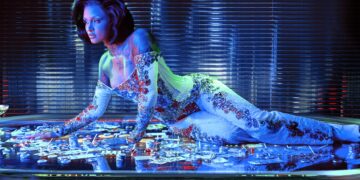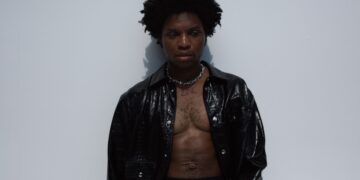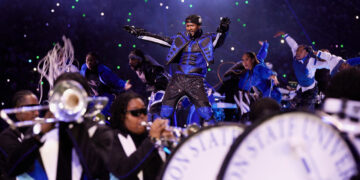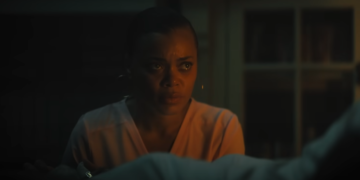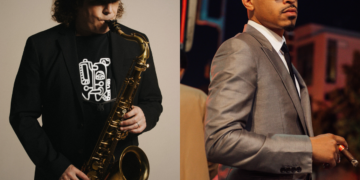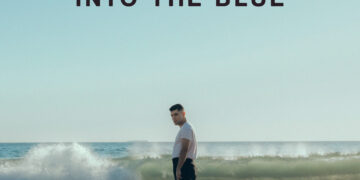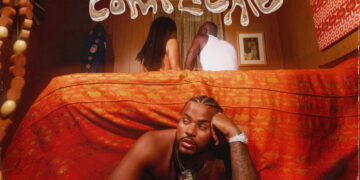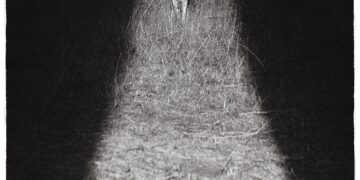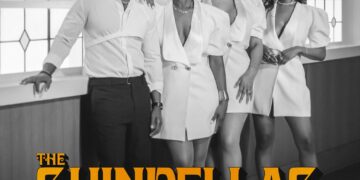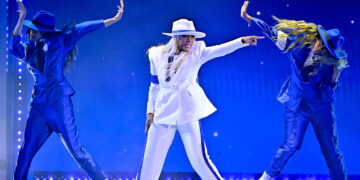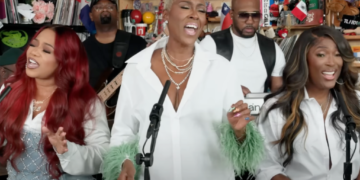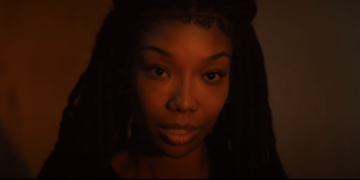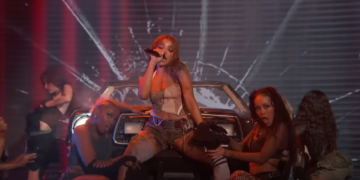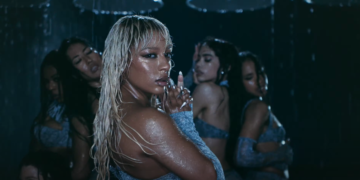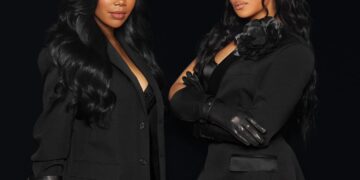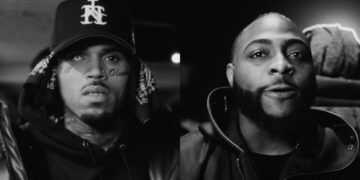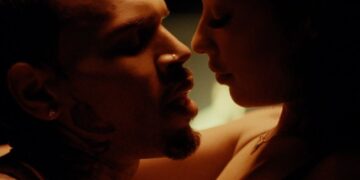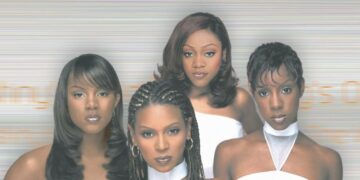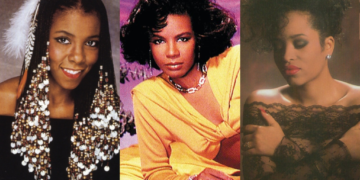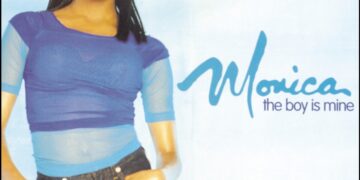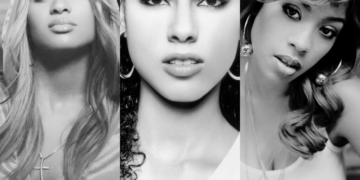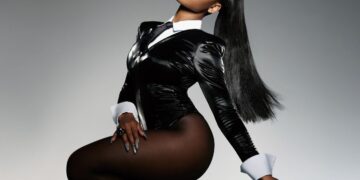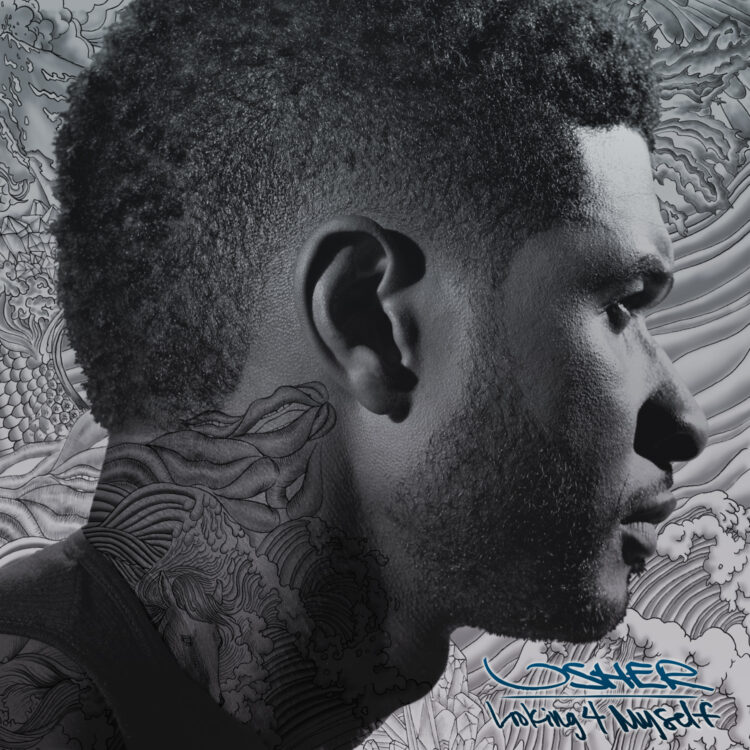On April 16, 2011, Usher attended day two of the Coachella Valley Music and Arts Festival in Indio, California. It was ten days before the start of the North American leg of his OMG Tour in support of his sixth album, Raymond v. Raymond. Australian electronic duo Empire of the Sun, consisting of vocalist Luke Steele and producer Nick Littlemore, performed at the festival that night.
Rocking a light pink t-shirt and black pants, Usher was spotted at the fore of the crowd watching the band’s set as they performed material from their debut album, Walking On a Dream. Something unique about Empire of the Sun’s performance intrigued Usher.
After their performance, Usher went backstage to greet the duo. “That was a cool meeting,” Steele recalls to Rated R&B. “The show really affected him. It’s amazing when that happens — the synergy of time when people meet. It was like we were meant to meet at that time.” Empire of the Sun’s Coachella set sparked inspiration for Usher’s next album at the time, Looking 4 Myself. “He was like, ‘Let’s make some music. Let’s make some tracks,” says Steele.

“[Usher] felt a huge wind of inspiration. He was kind of diving into what they were doing sonically,” producer Pierre Medor tells Rated R&B. (Medor, who’s also part of Tha Cornaboyz, worked on a production team led by Rico Love for Looking 4 Myself. More on that later.)
By 2010, Usher was gravitating more towards electronic dance-influenced music. Years prior, he dabbled with it on songs such as his 2004 smash “Yeah!” and “Red Light,” both lifted from his Confessions album, as well as 2008’s “Love In This Club” from Here I Stand.
His album Raymond v Raymond (2010) featured dance-pop/R&B tracks, including the Billboard Hot 100 chart-topper “OMG,” “DJ Got Us Fallin In Love,” which peaked at No. 4 on the same chart, “Somebody to Love (Remix)” with his mentee Justin Bieber and the bonus track “More.” He also collaborated with Ciara on the electropop bop “Turn It Up,” produced by T-Minus and Tricky Stewart.
It was apparent that Usher was expanding his lane in music, and his success showed that the masses were receptive to him occupying different spaces in music. In 2011, he teamed with EDM DJ David Guetta on the pulsating banger “Without You,” which went to No. 4 on the Hot 100. That year, he also joined bachata singer Romeo Santos on “Promise,” securing a No. 1 hit on Billboard’s Hot Latin Songs chart.
“You could hear how he was stretching himself to try different styles but managed to make sure his identity was still housed within that environment,” says Medor, who engineered the session for “Without You” and co-wrote “Promise” along with Rico Love.
When it was time to work on the album, Usher was adamant about giving himself the space to explore new sounds and ideas freely. “I remember walking in the studio and Usher had a huge sign put up that read, ‘Evolve or Evaporate,'” Medor recalls.
“That’s how you stick around. Evolve or evaporate,” Usher told Spin in a 2012 interview. “You have to be very cognizant of what’s going on around you. You can’t be so bold and reluctant to be receptive to change that you don’t allow yourself to grow.”
Usher’s career serves as a great case study for what it means to evolve or evaporate. From his self-titled debut album in 1994 to Raymond v Raymond in 2010, Usher had reinvented himself with each release. Not only was Usher headstrong about allowing his creativity to run free but he also wanted to foster an environment for his collaborators to feel uninhibited.
“When [‘evolve or evaporate’] was put in this context, it created a different sense of urgency about taking the boundaries off of what we thought we had to create,” Medor shares about the early recording sessions. “That was liberating for all of us in the studio.”
Usher enlisted a range of songwriters and producers to contribute to Looking 4 Myself, including Jimmy Jam & Terry Lewis, Pharrell Williams, Salaam Remi, Max Martin, Rico Love, Eric Bellinger, Elijah Blake, Diplo, Noah “40” Shebib, Pop Wansel, Swedish House Mafia and more.
Looking 4 Myself was released June 12, 2012, via RCA Records. It debuted at No. 1 on the Billboard 200, selling 128,000 copies in the first week, and it became Usher’s fourth consecutive chart-topper on the Billboard 200.
To celebrate the 10th anniversary of this underrated album, Rated R&B unpacks a few singles and album cuts with commentary from collaborators Eric Bellinger, Elijah Blake, Luke Steele, Pierre Medor, Rico Love and Ronny “Flippa” Carlson.
“Climax”
Producer: Diplo
Writers: Usher, Johnny “Natural” Najera, Elijah Blake, Diplo, Ariel Rechtshaid
Usher launched his Looking 4 Myself era with “Climax,” the album’s lead single produced by Diplo. It was released on Valentine’s Day, but it wasn’t necessarily a lovey-dovey anthem. Instead, Usher croons about a relationship that seems to be stalling and both partners not giving it the gas to keep it moving. “Going nowhere fast / We’ve reached the climax / We’re together, now we’re undone / Won’t commit, so we choose to run away,” he sings over a haunting backdrop.
Diplo noted that his production drew inspiration from The Weeknd’s House of Balloons mixtape. “When I heard those early records[,] they blew my mind – soulful in their silences, and a spacey iconic voice that felt uniquely internet. The idea of R&B having dark edges was what I wanted to bring to @usher,” Diplo tweeted in 2020.
“Climax” beautifully illustrates Usher’s razor-sharp falsetto that isn’t so easy to duplicate. “This was an opportunity for me to really show my vocal ability — lot of high notes in this record,” Usher told Freshly Squeezed. “Climax” is easily in the ranks of Usher’s most iconic songs.
Elijah Blake, who co-wrote the song, told Rated R&B in a 2021 interview, “I think [Usher put out ‘Climax’] because he had established this trust between the R&B world and the Black audience, of course, with what he’s done on 8701, My Way and Confessions. When they heard that R&B crooning [and] that melody, it just cut through all the noise like a knife.” And it most definitely did. “Climax” peaked at No. 1 on Billboard’s Hot R&B/Hip-Hop Songs chart in the U.S. and No. 1 on the UK R&B charts.
“Lemme See” feat. Rick Ross
Producers: Jim Jonsin, Mr. Morris
Writers: Usher, Rick Ross, Jim Jonsin, Mr. Morris, Nikolas Marzouca, Eric Bellinger, Lundon “Da Bridge” Knighten
“Lemme See” hears Usher, again, flexing his hair-raising falsetto over a mid-tempo, trunk-rattling production. The process of making “Lemme See” started at a writing camp at Circle House Studios in Miami, Florida. Mark Pitts, the album’s executive producer, played instrumentals for all the songwriters.
Eric Bellinger, a rising songwriter then, was among those present. “I knew when I heard this beat that it was something special,” he tells Rated R&B. When Pitts and the team heard what Bellinger was working on, they were impressed. “They were like, ‘Damn, I didn’t even hear that on this beat.'” Once Usher heard it, he wanted to connect with Bellinger immediately. “Usher was like, “Yo, fly that kid to Atlanta. I got to work directly with him out there.”
When Bellinger arrived in Atlanta, Usher had started recording “Lemme See” but there wasn’t a hook established yet. He reveals, “When I came, we finished it up. [Usher] had did the verse and the pre-hook. Then, [he] was like, ‘Yo, I didn’t do the hook yet. Let’s work on the hook together.’ So me and him co-wrote the hook together and that was crazy.” Bellinger also contributed background vocals to the record.
“Lemme See” was the album’s third single. It was the follow-up to the Max Martin and Shellback-produced “Scream,” peaking at No. 46 on the Billboard Hot 100.
“Dive”
Producers: Jim Jonsin, Daniel Morris, Rico Love, Frank Romano
Writers: Daniel Morris, Frank Romano, James Scheffer, Rico Love
Rico Love wrote “Dive” with Michael Jackson in mind. “Obviously, Michael had already passed, but I wrote it as if Michael was here, what would he sing?” he explains about the slow-burning tune.
“Dive” was the final single from Looking 4 Myself, though it wasn’t a commercial success. “I was a little letdown,” Love admits to Rated R&B. “I felt like ‘Dive’ was gonna change my entire career. I had several hits and already was established, but I just thought, ‘Okay, this is what’s gonna make everybody respect Rico Love.'”
But, he remains optimistic. “I think that when it’s all said and done, something’s going to happen and that song is going to be used for something big. I don’t think great songs just die.”
Love also reveals that Trey Songz’s “Heart Attack” was written for Usher initially. He envisioned it to be the follow-up single to “Climax.”
“I Care For U”
Producers: Danja, Johnny “Natural” Najera
Writers: Danja, Eric Bellinger, Johnny “Natural” Najera, Kevin Cossom, Marcella Araica, Usher
“I Care For U” was written from the perspective a man who knows he has feelings for someone but doesn’t have the emotional stability to call it the four-letter word that begins with L.
“I think [Usher] was in a place that he didn’t know who he was, so it was impossible for him to give someone himself,” Bellinger expresses. “It felt like that was the time when he was really having fun and trying different things. He didn’t have enough foundation to tell someone that he loved them. Because if you’re looking for yourself, how can you give?”
Usher alluded to this in a Reuters interview. “‘Saying ‘I care for you’ is like saying ‘I love you’ without saying those words. I think those can be dangerous words, so I had to find a creative way to say it without saying it. ‘I love you’ can be scary. It can be dangerous,” he explained.
“What Happened To U”
Producers: Noah “40” Shebib, Johnny “Natural” Najera
Writers: Carl Thompson, Christopher Wallace, Eric Bellinger, Noah “40” Shebib, Norman Glover, Reginald Ellis, Sean Combs, Sidney Brown, Usher
At first listen, “What Happened To U” sounds like a letter to an ex but it’s an inward-looking track. Usher told Boombox in 2012, “It’s all about the sacrifices we have to make as entertainers.”
“What Happened To U,” which samples The Notorious B.I.G.’s “One More Chance,” was Bellinger’s second song he co-wrote with Usher. After impressing Usher with “Lemme See,” the R&B superstar wondered if Bellinger could do it again. “I was like, ‘Is this guy trying to do reverse psychology?” Bellinger laughs, before sharing he took it as an opportunity to showcase more of his writing skills.
“That was one of my favorite sessions in life,” Bellinger recalls. “I’m not just here writing songs. I’ll break down your whole biography on the record. There’s no better way to penetrate than to speak someone’s story to them. I literally was on Google doing research in order to present this song,” Bellinger notes, before reciting the pre-chorus: “Money, clothes, fancy cars / Big old cribs, platinum on the wall / Seven Grammys, sold-out concerts / Damn, I’ve been working hard.” (Note: Usher now has eight Grammys.)
“Looking 4 Myself” feat. Luke Steele
Producers: Rico Love, Pierre Medor, Earl Hood, Eric Goudy
Writers: Earl Hood, Eric Goudy, Pierre Medor, Rico Love
Rico Love was also in attendance at Coachella with Usher and was inspired by Empire of the Sun’s performance. “I think the idea for the title track ‘Looking 4 Myself’ came from me watching that performance. That album from Empire of the Sun was one of the greatest projects I had heard in a while,” Love tells Rated R&B.
Interestingly, Love tells Rated R&B that he originally wrote “Looking 4 Myself” with CeeLo Green in mind. “I didn’t think Usher would do it,” he admits. “I didn’t think he would trust himself enough to do it then, honestly.” But when Love presented it to Usher, he fell in love with it.
Usher had invited Luke Steele to Atlanta to work in the studio after expressing interest in working with him at Coachella. Steele confesses he was a bit overwhelmed working with an artist of Usher’s magnitude. “He’s such an institution. He’s been around for so long and changed many people’s lives. It was sightly intimidating stepping into his world — a superstar’s world,” Steele shares with Rated R&B.
Although Steele came in towards the end of the song’s creation, he got to witness Usher record his vocals and was stunned by his performance in person. “I’m not a singer-singer,” Steele discloses. “I’m a character singer. Take number one may be good or take number 322 may be good. [Usher is] the total opposite. He’s just like the singer’s enigma. It was incredible to watch him sing on a microphone, cut vocals and chop melodies.”
Medor, who was present at the recording session, echoes Steele’s sentiments. “When they got to cutting the vocals, that’s where you really get to see Usher’s genius unfold. He brings the lyrics to life in a way that becomes the bar for most artists,” says Medor.
“Looking 4 Myself” finds Usher doing some soul-searching. “When I wrote ‘Looking 4 Myself,’ that’s where [Usher] was in that particular time,” suggests Love. “Honestly, I think that’s where he still is. He’s always on the journey for self.”
“Lessons For The Lover”
Producers: Rico Love, Pierre Medor, Earl Hood, Eric Goudy
Writers: Earl Hood, Eric Goudy, Pierre Medor, Rico Love
On “Lessons For the Lover,” Usher shares advice to those who may be experiencing tumultuous times in a relationship. He understands that relationships can be complicated but shouldn’t be given up on so quickly. “Don’t go so easy / Let that argument turn you on / It’s worth it,” Usher sings.
Love, who is a close friend to Usher, believes “Lessons For the Lover is “the closet to what Usher really is.”
“If you know Usher personally, you’ll know that that’s his mentality. He thrives on conflict. I hate to say it,” Love laughs. “Nobody likes drama, but I just think the conflict is kind of where he becomes his best self.”
Medor was at the studio when Usher recorded “Lessons For the Lover” as well. “He prides himself on getting immersed in the emotion of the song,” says Medor. “He won’t go in the booth unless he’s absolutely sure of the emotions he’s trying to visit. He’s very clear on where he wants to take his listener.”
“Sins Of My Father”
Producer: Salaam Remi
Writers: James “Jimmy Jam” Harris, Rico Love, Salaam Remi, Terry Lewis, Usher
“Sins Of My Father” is among the personal moments on the album. Love tells Rated R&B Usher came up with the song’s concept and even had the title in mind before they started working on the music.
Usher explained to The Sun in an interview, “‘Sins Of My Father’ touches on different generations and the curses they must deal with and wanting to break it to change the course, so that my kids won’t have to deal with it.”
Love recalls having a deep conversation with Usher in the studio that inspired the song’s lyrics. “It was a really emotional conversation,” says Love. “It had a lot of pauses. It was a conversation where we would stop for a second and [Usher] would just be looking into space. It was a heavy day.”
“I.F.U.”
Producers: Andrew “Pop” Wansel, Rico Love
Writers: Andrew “Pop” Wansel, Autoro “Toro” Whitfield, Rico Love, Ronald “Flippa” Colson
“I.F.U.,” which stands for “I’m freaking you,” was one of the last songs recorded for Looking 4 Myself. It appears on the deluxe edition of the album. Ronny “Flippa” Colson, a then-budding producer, worked under producer Andrew “Pop” Wansel’s wing. They were at Circle House Studios with Rico Love when they played him various instrumentals, including the one for “I.F.U.” Love expressed interest in the beat for “I.F.U.” but there was just one slight issue. “Pop didn’t have the stems files on his hard drive,” Colson tells Rated R&B.
So, Colson was tasked with remaking the beat. “Pop was like, ‘Yo. Since you’re my young n*gga, redo the beat in your headphones.’ Literally, I mimicked everything Pop did. Rico was writing to the two-track already while I was remaking the beat.”
The original version of “I.F.U.,” which isn’t the album, is much more explicit. Let’s just say there’s “a whole lot of f*cking” going on. Even Usher was skeptical about getting too explicit in the song. “That’s back when he didn’t even wanna curse,” explains Love, who was keen on keeping the dirty version. “I was really stressing that he kept it dirty on there. I wanted us to release that as a viral record. Honestly, management plays a part at that particular time too, because you gotta be fearless. Usher is actually really fearless, but sometimes you’ll get people around that’ll be like, ‘You can’t say this.'”
“Say The Words”
Producers: Luke Steele, Surahn “Sid” Sidhu
Writers: Luke Steele, Surahn “Sid” Sidhu, Usher
When Usher says, “This is for my…” at the start of the track, it’s reminiscent of his beloved Confessions song, “Superstar.” On “Say The Words,” Usher serenades his “one and only love.” It’s perfect for cuddling under the stars with that special person.
Steele had started writing the lyrics for “Say The Words” at his New Zealand home with his guitarist. He reveals, “I love that song. [It’s about] a guy who basically falls in love with the girl next door. Every day after school, they hang out. They’re in a small town, and they’re looking at the world and these places they’re going to go once they get out of school.”
When Steele linked with Usher in the studio, he didn’t have a second verse penned yet. “It was great because Usher came in with that and we fleshed that out,” he shares. Steele isn’t credited as a featured artist on this track but he does contribute backing vocals. “We kind of got to scatter out and riff out a bit with the vocal melodies at the end. I do a falsetto and then he comes in. It was cool to hear our voices side by side in that sort of flow.”
Looking 4 Myself: 10 Years Later
Looking 4 Myself is one of Usher’s most expansive albums, though it often gets overlooked in conversations about his music.
It’s a rhythm and blues album at its core, especially regarding Usher’s vocal performance. “I listen to a lot of dance music. I worked with electronic and dance producers, but I never lost the essence of R&B/soul and vocal,” Usher pointed out to Wall Street Journal.
The only difference with Looking 4 Myself is Usher experimented more with the rhythm section. “If he did acapella with the acoustic guitar, it would immediately sound like the traditional R&B. It’s literally just production,” Bellinger hypothesizes.
Usher created a world with Looking 4 Myself that also challenged listeners, particularly his core fans, to be just as open to change as he was when he made the album. Listening to the album feels like a journey from start to finish.
One of the intriguing aspects of the album is its sequencing. In the matter of three tracks, he goes from a club banger (“Lemme See”) to a ’70s funk-inspired jam (“Twisted”) to a bedroom ballad (“Dive”). It may appear directionless to some, but life’s path isn’t a perfect line. There are many twists and turns along the way, just like there are when one is searching for something.

Conversely, Love believes the album’s sequencing could have been improved. “I wish I would’ve had more input on the sequencing overall. I did a lot of songs [but] I was not involved in the way that I felt like I wanted to be involved.” He also candidly shares that he would’ve made the album shorter.
“There were songs that I would’ve definitely done without,” he shares, before disclosing he would’ve cut “Can’t Stop Won’t Stop” and “Scream” from the album. “To me, those are the two least impactful records on the album. And to start your project off like that? If I would’ve been in the cutting room, they would’ve been left on the floor.”
Love’s remarks about the album aren’t a slight towards Usher. He believes some of the decisions were out of Usher’s control. “Usher’s whole energy towards this project was ‘I don’t wanna play safe.’ I don’t believe that he got the opportunity to truly go there on this album. I feel like they kind of played it too safe.” Love even feels “Euphoria” should have been a single. “It should have been a record that got more attention. That was incredible.”
When Bellinger heard Looking 4 Myself in its entirety, he says he was floored. “I loved it all just because it was so risky. I’m a real risky person when it comes to trying new things,” he tells Rated R&B.
There is always some gamble associated with an artist choosing to evolve their sound. But there’s also a risk in remaining stagnant in the ever-changing music world. “This is definitely an ongoing story of a career that’s built,” Usher said at a BET listening event. “Every chapter has a specific place, meaning and purpose. This one was more experiential for me more than anything because of the places that I went, the people that I saw [and] the things that I was introduced to. I’m a forever evolving person.”
Revisit Usher’s album Looking 4 Myself below.





